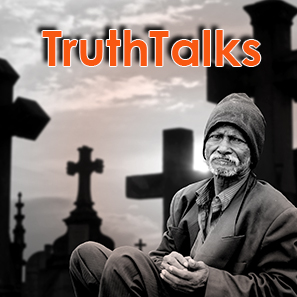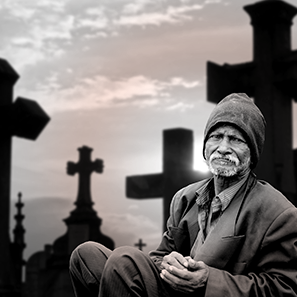The Emperor’s New Clothes

The Emperor’s New Clothes is an amusing yet sobering story written by Hans Christian Andersen in 1837. I find it sobering because it speaks penetratingly into our current national and international state of affairs.
The Story
The story starts with the words: ‘Many years ago, there was an Emperor so exceedingly fond of new clothes that he spent all his money on being well dressed’. One day two swindlers arrived in the city and spread the story around that they could weave the most splendid fabrics imaginable. “Not only are their colours and patterns exceptionally fine”, they said, “but the clothes we make from this cloth became invisible to anyone unfit for public office or unusually stupid”. The Emperor heard about this and immediately decided that he needed a new set of clothes made from such unique cloth. Besides being very vain, he was also rather stupid because he thought that by wearing these new clothes he would be able to tell who among his subjects were wise and who were foolish or unfit for public office simply by the way they reacted to the magical material. So, he hired the two con-men and ordered them to get busy right away. They set up their looms and pretended to weave. They demanded the most costly silk and purest thread, which they packed away into their travel bags as loot and continued day and night to weave thin air.
The Emperor was keen to see how the special cloth was progressing but he was nervous of going into the spinning room (and we know why) and decided instead to send in his most trusted cabinet minister. When the poor man entered the room he could immediately see, well, nothing, but he didn’t want to admit this; hey, he wasn’t stupid! “Don’t hesitate to tell us what you think of it,” said one of the weavers. “Oh, it’s beautiful; it’s enchanting.” The old minister peered through his spectacles. “Such a pattern, what colours!” I’ll be sure to tell the Emperor how delighted I am with it.” So, the Emporer decided to see for himself and accompanied his trusted minister into the spinning room. Although he, of course, couldn’t see anything on the looms, his minister immediately pointed out all the wonderful colours and intricate patterns of the magical material. So he pretended to be very pleased with the cloth and even awarded the swindlers the titles of ‘Sir Weaver’. The word soon got out to all the government officials and everyone in the city (the cities were very small in those days). His cabinet ministers, wanting to show just how clever they really were, suggested that the Emperor should lead a grand procession through the streets to show off his magnificent new attire.
The day eventually came when the crooks announced that the new clothes were ready and the Emperor and all his officials went to see them. The swindlers each raised an arm as if they were holding something. They said, “These are the trousers, here’s the coat, and this is the mantle,” naming each garment. “All of them are as light as a spider web. One would almost think he had nothing on, but that’s what makes them so fine.” Everyone in the room oohed and aahed and nodded approvingly. “If Your Imperial Majesty will condescend to take your clothes off,” said the swindlers, “we will help you on with your new ones here in front of the long mirror.” So they dressed him in nothing and he strode out wearing nothing to lead the parade through the city. The crowds applauded wildly and nodded approvingly to each other because no one dared to admit that they were not able to see the new clothes. Just then a small child exclaimed, “But he hasn’t got anything on!” and soon everyone was laughing and agreeing loudly that the Emperor was in fact naked. However, the Emperor was too proud to admit that he had been duped and so he just went on marching down the street without a stitch of clothing (my apologies to the late Mr Andersen for taking liberties with his famous tale).
Why I find this story sobering
The story might have been intended as a caution against the stupidity of pride but I see in it a parody of our world, and particularly our nation.
The COVID-19 virus has come to town and stripped almost everything naked. Let me explain what I mean by this.
National unity
I have spent far too many hours following the political and social malfunctioning of the United States of America. Frankly, I am appalled and distressed at the hypocrisy, arrogance, and outright deceit on parade almost every day; far more from the Left than the Right I have to say. But I am not an American and I have no right to criticise what to me seems such dangerous dysfunctionality. However, I am a South African born and bred and what I am part of here on my home soil is even worse than what I observe overseas.
Here in South Africa, we have known for a long time that we are a divided nation. For decades there has been tension between citizens of different colour or culture but we have pretended that such tension doesn’t exist.
Racism, even if just verbally, has become a major offence libel to prosecution and punishment. At the same time, xenophobia spreads unabated among the poor and unemployed of the land. The ruling party, once united by common liberation fervour is now a glaring example of disunity at its worst.
Yet, believe it or not, the ‘emperor’ and his officials still stoutly maintain that the party is as united as always and that their team colours remain rainbow-hued – just like the Emperor’s invisible clothes.
I could write many more pages on the sad state of our national political and social condition but I would rather pose a simple question we all need to answer:
Are we going to continue to line the metaphorical streets of our nation pretending that the emperor isn’t naked or are we going to name it for what it is?
It seems that our current State President has recognised the nudity of the government over which he presides and is trying very hard to change things. We can help him do this by naming and shaming every public official that dares to parade ‘in the nude’ though our nation and we can applaud the men and women in power who have ‘cut their clothes according to their cloth’ and who are working hard to cloth, feed and secure employment for the people of our land.
We can also play our part in bringing about national unity by supporting political parties and causes that sincerely strive towards this end. We can, also, do our best to abstain from racially biased language or group generalisations. Most of all, we can treat all people, no matter what their colour, political affiliation, religious persuasion, or sexual orientation with dignity and generosity of spirit.
Corruption and violence in the raw
We have also known for some time that corruption is rife in our society, but I doubt if many of us saw just how corrupt we as a nation have become… until COVID-19 that is.
The virus has spread through our society like a biblical plague and one of the things it has revealed is the terrible extent of massive theft and horrendous violence.
The amount of money, our money, that some greedy and conscienceless officials and business people have plundered could finance national economic prosperity for decades to come. We used to speak in millions stolen but now we speak of billions or even trillions! Once again the virus has stripped our nation bare. Now we can see the countless men, women, and children who are starving and desperate because of the unimaginable greed of a few. These conscienceless criminals have even stolen the relief fund necessary to combat the pandemic and to provide relief to the jobless.
However, corruption does not march alone through the streets of our nation but is accompanied by terrible violence. Men are slaughtering women, children, and farmers with nauseating frequency and barbarism. This has been part of our national sickness for decades but now COVID-19 has cast its morbid light on the bleeding nakedness of our national condition. It has put immense pressure on the violent and brutal among us and their terrible deeds are bare for all to see.
Here again, we have a choice to make. We can throw off the near-invisible garment of law and order and join the thieves and abusers (God help us!) or we can all work to support the efforts of those who are bringing about change. And here again, it appears that our President and many in his government are trying hard to catch the crooks, expel the corrupt, lock-up the perpetrators of violence, and restore the dignity and prosperity of the people of our land.
We can support such forces of good, in government, opposition politics, and business by paying taxes, obeying the laws of the land, speaking well of those who mean well, and voting into power good men and women.
We can join civil societies and local initiatives to resource and man the struggle to make it safe for women and children to live fearlessly in our country. We can raise our voices loudly when we encounter farm murders, political assassinations, and gender-brutishness in any form.
The state of the church
I could write about so many other aspects of our current national situation such as the economy, business, and so on, but in this article, I only want to develop some ideas concerning the church in South Africa. There is a saying, ‘As goes the family, so goes the nation’ but there should be another equally true adage: ‘As goes the church, so goes the nation’.
During the more than six months of lockdown of one level or another, the gathered church has suffered stress and fracture. No pandemic can threaten the nature and importance of the church, but it can and has threatened its vital corporate components. For COVID-19 has stripped away the clothing of the gathered church. Why does the church gather? Well, the virus has shown that it isn’t just to listen to a sermon because we have all seen now that we can view any sermon we chose from our armchairs at any time we choose and on any day we choose. It is not just to listen to Christian songs for we can also do this via live feeds or prerecorded videos.
From my perspective, the three essential elements of the gathered church are:
- The sense of the immediate presence of God by his Spirit,
- Interaction with one another in ministry and fellowship, and
- Participation in the preached Word.
We sense the immediate presence of God most acutely when we gather with other Spirit-filled believers to worship. We interact with one another by sharing, testifying, praying together, and ministering the gifts of the Spirit to others. We participate in the preached word by interacting, responding, and discussing the biblical text with others. These are the reasons why we gather as the Temple of the Lord and the Body of Christ. It’s not that we can’t worship alone or in families as we do this all the time irrespective of whether or not we gather as a church. We can pray for others and communicate with them via the electronics at our disposal, and we can both hear or read any number of fine sermons.
But none of these come anywhere near to experiencing the dynamics of meeting as the gathered household of God!
However, and it’s a big ‘however’, churches will also need to carefully consider their Sunday service structure and content. Large churches will have to wrestle with the current legislated limitation of 250 people per indoor gathering. If they do not find a way of staging multiple meetings every week then their finances and infrastructure may be fatally stressed. Traditional ‘hymn and a thing’ churches will need to answer the question: ‘What are we offering in a gathering that our people are not already getting via the internet?’ Churches of all sizes and types will need to decide what to do with children and youths whilst maintaining strict health protocols. Churches will also need to work out how to balance health safety requirements against the need to gather together physically. These are indeed challenging times!
Again, the question is what we should do about this situation. Well, we can stand in unity with our church leaders as they come to the difficult decisions of when and in what manner to start meeting again as congregations. We can bear patiently with interim measures and arrangements, but sooner or later we need to be bold enough to meet again as the gathered church.
A new normal that has the church ungarbed in its corporate attire is as pitiful as a naked Emperor marching at the head of a snickering parade.
Perhaps this current time of abnormal new-normal will be an opportunity for us to think prayerfully through, and change where necessary, some aspects of gathered church meetings. How well do the elements of our services meet the three key dynamics:
- The sense of the immediate presence of God by his Spirit
- Interaction with one another in ministry and fellowship
- Participation in the preached Word.
This present time may well be offering us an invitation to conform more closely to the New Testament model of the gathered church.
My appeal to every Christian is:
- To commit afresh to the importance of the gathered church, and
- To accommodate the church leaders plans to restore us to healthy church life – try to make the new arrangements work for you.
What to do, THAT is the question before us
It is easy to describe the nakedness of our current situation but it is not as easy to prescribe what clothes we should be wearing. I, like most of you reading this, are not State Presidents or the like; we are ordinary people with limited resources and small circles of influence. So, addressing the dire situation we find ourselves in we can probably only respond in the following ways:
- We can PRAY for our nation, our government leaders, our church, and the people we know and love. We can ask God to send a mighty Jesus-centred revival upon our churches and societies.
- We can commit ourselves to SET AN EXAMPLE of biblical righteousness in what we do and say, how we conduct our businesses, and how we interact with others. We can do whatever we can to help the poor and hopeless in our sphere of influence.
- We can GET INVOLVED in our neighbourhoods, political organisations, groups and initiatives working to restore our land to godly status. We can participate in petitions for noble issues. We can speak out against godlessness.
- We can VOTE locally and nationally as the occasions present themselves and we can vote with our finances and patronage. We can ‘vote’ by booing the naked processions of foolish or wicked officials and we can applaud and support those who march in the robes of righteousness.
- We can HOLD TO ACCOUNT all in public office, all church leaders, and all business leaders. We can hold them to account against biblical God-honoring values, principles, and priorities.
- Most of all, we can INTRODUCE PEOPLE TO JESUS in this time of such desperation when people are searching for answers and divine intervention. We can also help them become more like him, and encourage them to do likewise for others.
- We can also partner with the Lord Jesus in BUILDING HIS CHURCH… starting with our local church.
Jesus has the final word
As always, the risen Lord of All has the final word on the kind of things about which I have written in this article.
Revelation 3:17-18 “You say, ‘I am rich; I have acquired wealth and do not need a thing.’ But you do not realize that you are wretched, pitiful, poor, blind and naked. 18 I counsel you to buy from me gold refined in the fire, so you can become rich; and white clothes to wear, so you can cover your shameful nakedness; and salve to put on your eyes, so you can see”.
The Emperor’s New Clothes Read More »








